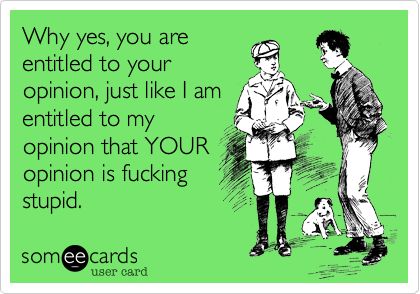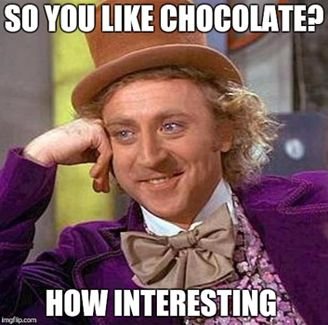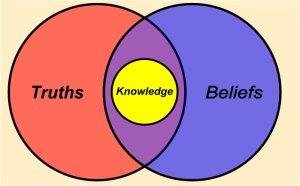Are you entitled to your opinion?
Have you ever been discussing an idea with someone where you reach an impasse of disagreement, and one or the other of you declares, “I’m entitled to my opinion”? When I sat down to write about this topic, I was going to give a surly, condescending rant about how obviously stupid this phrase is. But as I thought about it, I realized it deserved a more serious examination.

Source
DISCLAIMER: The following is my opinion.
Most of us are taught that statements can be broken down into two categories: facts and opinions. Facts are objective. They are true despite what we think or believe, and they are verifiable out there in the world. Opinions are subjective assertions that may or may not be true. People have conflicting opinions, and this is to be expected since opinions by their nature are not verifiable with certainty.
However, this dichotomy camouflages a more complex reality. And in this post-fact world that we seem to find ourselves living in, the resulting confusion causes more and more harm.
I'm going to suggest that there are several distinct types of opinions, each of which has different characteristics, and that they should therefore be approached differently. Further, it is the conflation of these opinion-types that causes confusion in communication and makes agreement much more difficult, especially when it comes to hot-button topics.
Here are my three categories of opinion (though further thought may suggest additions):
- Opinions of taste
- Opinions of fact
- Opinions of prediction
Opinions of Taste
Opinions that fall into this category are the ones most people would identify as opinions. Massages feel good. That rainbow is beautiful. I like chocolate, and vanilla can suck it!

Source
Here's the funny thing about this kind of opinion: it is verifiably true with certainty. Such statements say little about the thing discussed, but instead say something about the person making the statement. You like chocolate. Your tastes are defined by your subjective experience, so there is no outside authority or fact that can change the truth of that experience.
Such simple opinions of taste are probably the only cases where "entitlement" is relevant to opinion. Example: Sam declares that chocolate is a horrible scourge upon society. Bill says he likes the taste of chocolate. Sam calls Bill a savage and claims there is no good reason for anyone to like chocolate. Bill wins the argument by saying, "I am entitled to my opinion."
Sure.
But very few people get into heated debates about their positive or negative experiences with chocolate. We instinctively recognize that simple opinions of taste have no real power to cause controversy.
Another way to define opinions of taste is to recognize that they are always statements that express VALUE. Value by its nature is subjective, and only a subject can assert the truth of a value statement. X is good. X is bad. What such value statements really mean, however, is "X is good for me" or "X is bad for me". All value is defined by perspective.
Now look, the perspective in question may be as large as humanity itself: Ingesting cyanide is bad. That's true for every person on the planet. Other questions of value probably run up against a more divided perspective: Lesbian zombie comics are good. While the value of cyanide is more or less defined by universal biological qualities, the enjoyment of lesbian zombie comics is determined more by one's cultural experience, which can differ from person to person.

Hey, if Tom Hanks likes it...
But not all opinions of taste are so simple and verifiable. "I like the graphic novel, Lesbian Zombies from Outer Space," and "Lesbian Zombies from Outer Space is a great graphic novel" are both opinions of taste, but they are making two distinctly different claims. The first claim is a statement of your specific experience with a particular book. The second statement claims that the book is great, and this is a status that goes beyond one's individual reaction to it. To make this assertion, you must have a pretty good understanding of what graphic novels are, and what qualities make them good or bad or exceptional. The latter claim, in fact, is a much more complex assertion, since it sits atop a set of assumptions about the thing in question. Said another way, the statement that a graphic novel is great rests upon certain premises about which the speaker assumes there is some agreement.
Forget lesbian zombies. Let's talk about something I know you have an opinion on:
Trump is a great American President. That is an opinion of taste. But the reason for a person's belief in such a statement is not as simple as licking some chocolate ice cream and reporting how it makes you feel. One first has to have a set of beliefs regarding what a president is, what a president does, what behavior in that position benefits America, what behavior in that position benefits you as an individual, what previous presidents did before, and how the current behavior, and its resulting effects, compares to those previous presidents, etc. Some of these underlying beliefs are opinions of fact, and some of them are just more opinions of taste.
The point here is this: no one can verify the truth of such a "high level" opinion until he first examines the underlying opinions and assumptions that support it; and no one with intellectual honesty can make such a claim without first examining the reasons behind it.
Of course, the reverse is also an opinion of taste: Trump is a shitty American President. I'll let you judge which is the opinion that more likely coincides with reality.
Opinions of Fact
Without wishing to get caught up in the weeds of relativism, I've got some possibly disturbing news: all facts are beliefs; and they are beliefs in the same way, though perhaps for different reasons, as opinions are beliefs. Whatever we assert to be true, we assert to be true because we believe it to be true. Paris is the capital of France. Two plus two equals four. Humans are natually bipedal. These are all facts. These are all true. These are all easily and unequivically verifiable. But it's important to understand that they are all still beliefs.
Why is this important? Because many people seem to have reached the flawed conclusion that "beliefs" are somehow less valid or valuable than "non-beliefs", whatever they are. But there's actually no such thing as a "non-belief" (a concept I just made up), because all assertions of truth are by definition beliefs. We just like to dress up these beliefs with words like "knowledge" or "fact" or even "truth" itself.

Source
Don't worry. I'm not going to insist that we label such basic facts as the capital of Paris "opinions of fact", even though they do seem to have a lot in common with the low-level opinions of taste I mentioned above, like value judgments about chocolate.
Once we move away from the easily verifiable, however, we get into the territory of opinion, whether we like it or not. Any statement of belief that does not make a value judgment (or does not make a prediction about the future, as discussed below) is an opinion of fact. Opinions of fact attempt to describe and explain the world around us.
Here's an example: Vaccines cause autism. This is an opinion of fact. It makes a claim about the world - that some quality of vaccines can cause autism in children. Of course, the reverse is also an opinion of fact: Vaccines do not cause autism. The truth of these statements is not as easily verified as the capital of France. Yet, with enough time and effort, they can be proven or disproven.
The problem with opinions of fact is not that they are unverifiable; it's just that they are usually difficult to verify with certainty. And even when they are verified with certainty for some people (Vaccines don't cause autism, fuckheads!), others are not convinced by the evidence, or refuse to be convinced.
Now we start to see the interplay between opinions of fact and opinions of taste. When talking about vaccines, some parents will say that vaccines are bad, and there's no way to argue against that claim until and unless you overturn the underlying opinion of fact regarding autism. In truth, if two people are arguing about the value of vaccines without examining the root opinions of fact, it almost makes sense for one to shout out their entitlement to their opinion. At least insofar as they have been offered no reason to change their view.
Sometimes, though, the causal interplay can go in the opposite direction. Consider racism. All people of X race are bad or inferior. This is an opinion of taste. And if one holds such an opinion, she will be drawn to statements that support it, such as X race naturally has lower IQ, X race are all thieves, etc. These latter statements are all opinions of fact.
Well, shit. This is going longer than expected. I think this is going to require a Part II! I have more to say about opinions of fact; we'll touch on opinions of prediction; and then I'll wrap it up with a conclusion so astonishing and so satisfying that your perspective will be changed forever. Check back soon.

Recent posts:
- Socrates and Individualism, Part I
- Reason and Emotion: The Children of Desire, Part I
- Trial of Socrates: Teaser Scene Motion Comic
- Lesbian Zombies from Outer Space - Latest pages

Art courtesy of @PegasusPhysics
Well that was great to read!
When the phrase You are entitled to your opinion then you know the discussion is over.
I like how you broke it down to the 3 examples there.
What a great post. I really enjoyed reading that, and agree with your sentiments. One of my bugbears is the use of science. People love to use science to validate their own opinions, but they tend to forget that scientific studies have been used for arguments on both sides of the fence, vaccines causing autism being one of the big ones, there are so many studies that prove and disprove this. Let’s not forget that it wasn’t so long ago that cigarette advertisements used science to promote smoking, saying that physicians were claiming that smoking was good for your health! I’m sure I saw a headline to a news article recently saying that research has proven that coffee causes cancer, but again, not so long ago, I read somewhere that coffee was, in fact, good for you!... Opinions of fact, great stuff! Thanks for sharing your thoughts, I look forward to reading part 2! @dramamama
Right. Science is a process. Individual people or groups can do science poorly, or they can label things as science that are not science. And good science can be done that, over time and testing, turns out to have pointed to a false conclusion.
My mom - ever a searcher - at one point attended a church that claimed to combine religion and science. I went once, and it had the kind of people who said they could see your "aura". Anyway, this claim to science was absurd. One of the big proofs was that since the word "ohm" was used in talking about electricity, this was proof of the spiritual, because - guess what?! People often chant "ohm" when they meditate. Makes perfect sense, right?
It was a long time ago, and I'm probably forgetting some of their "reasoning".
Part of critical thinking is looking beyond labels. Just because something is called science, it doesn't necessarily fit within the rigorous process. Comparative studies examining scientific research are great for this. While any topic may have outliers, if most research points to one answer, you've got a lot more reason to trust that.
You are wrong to say "a lot of studies prove vaccines cause autism". There are NO studies which prove this. There was one study published in the Lancet (which started this whole mess) that made this claim, and was quickly confirmed to be unsound. If you want the truth of any topic like this, it's better to look at a comparative study if it's available. Here's one about vaccines, though it speaks to more than just autism: https://www.cmsri.org/wp-content/uploads/2017/12/MawsonStudyHealthOutcomes5.8.2017.pdf
Thanks for reading!
Thanks for your reply! And thanks for the link you shared. Both my boys are fully vaccinated by the way, and I tried to be as informed as possible before going ahead with their immunisations. I am friends with people in both camps when it comes to this topic, so I get bombarded quite a lot on social media with “studies” supporting their camp’s beliefs. I’m inclined to believe that there are no studies to prove this link, but try telling that to the anti-vax camp, and you’ll get something like the pic below as a response! It can all get a bit intense, just like the whole gun control issue, and it seems that the more opinions with supporting studies and facts are shared, the more polarised the two camps become. Anyway...... can’t wait for your part 2! Thanks again :)
Right. And that's where the whole opinion of fact vs opinion of taste conflict becomes problematic. If you've got certain tastes/values, you're likely going to be drawn to certain factual claims or studies. More or less falls under the umbrella of confirmation bias.
This was a really good post. I have been toying around with also writing a post about opinions and I was going to have the title be "Losing my Opinion". I don't know if it will ever come to fruition though. It was going to deal specifically with those opinions that people are better off keeping to themselves. Social media has made it too easy for people to express destructive opinions and find many other people who will validate those opinions. I was also going to touch on the fact that we somehow have discounted the opinions of celebrities simply because they are in the public eye. Does your net worth or status somehow make your opinion less valuable than the guy down the street with a MAGA hat? :) Again, thanks for this great post. Writing about opinions seems to bring about even more opinions!
Thanks for taking a look!
As for your point about celebrities: I think the larger point should be that the value of ideas cannot be determined by the qualities of the person speaking the idea. Ideas either work or they don't. They fit in with reality, or they don't. Honestly, this would seem to border on your comments about social media as well. Very rarely do I see ideas talked about on social media; all I see are people condemning or mocking opposing people and tribes.
If I scoff at Jenny McCarthy's campaign against vaccines, it's not because she's a celebrity. Her celebrity status does not devalue her idea or opinion. It's her lack of expertise in medicine and science which signals to me that I should probably not pay too much attention to her ideas that are relevant to those domains. Especially when those opinions conflict with people who are experts in those domains.
Experts are fallible like anyone else. But, as with @steevc above, I start with the assumption that they're less likely to be wrong about their expertise than someone who knows nothing about it. I mean, honestly, most of the time celebrities are people of equal intellect and education as the guy down the street with the MAGA hat - they just have larger audiences.
(Unless, of course, we're talking about celebrity scientists, etc.)
Good points. For celebrities I was thinking more social issues as oppossed to scientific. Not to open a can of worms but for example the anthem protests in America... Many people were saying just play the game or just do your job. Is their opinion about social injustices any less because they play a sport. That of course brings up the other argument about whether you can express your opinion while "on the job". Just interesting stuff to think about. I have my own opinions that I am entitled to :)
Well, I think reflecting reality is just as important in social issues as they are with scientific issues. Though proving the correlation often appears to be tougher. :)
As for kneeling at football games, I can't say that I gave it enough thought - at least not about what everyone was talking about. I generally find people's obsession - or even basic enjoyment - in watching sports fairly odd. And what I really find odd, is that the national anthem is played before sporting events at all. I have no idea why a bunch of fully grown meatheads running a ball back and forth across a field has anything to do with patriotism, freedom, or national unity. So, if I had my 'druthers, the kneeling anthem controversy would never have happened.
But Kaepernick clearly intended to make a point about race, and how the American promise has not treated every race equally. (I think that's a reasonable understanding of it?) I guess I'm not sure what you're asking me: does the fact that he's a famous football player lessen my opinion of his opinion? No. At least no more than it would if he were a non-famous football player. Are you asking if he had a right to communicate his idea in the way he did? Of course he had the right to do it. Do I think the negative reaction against him by fans was okay? I thought the reaction was excessive, though not particularly surprising. Do I think that the purpose of football is to make money, and that fans are watching to see feats of physical strength and agility rather than political and social statements? Yes, I think that's a given. And do I think that the owners of the team have to make their decisions on how best to milk fans for their money? Sure, I think that's true too. So, do I think that Kaepernick's right to free speech means that he can't suffer negative consequences from team owners if his actions are costing them money? No, I don't think that at all. Just because someone has a right to do something, it does not mean that the right protects them from all negative consequences that may result from exercising it. (For instance, I have a right to start a business. But it can very easily fail and I'll lose everything.)
Your Post Has Been Featured on @Resteemable!
Feature any Steemit post using resteemit.com!
How It Works:
1. Take Any Steemit URL
2. Erase
https://3. Type
reGet Featured Instantly & Featured Posts are voted every 2.4hrs
Join the Curation Team Here | Vote Resteemable for Witness
Congratulations! This post has been chosen as one of the daily Whistle Stops for The STEEM Engine!
You can see your post's place along the track here: The Daily Whistle Stops, Issue #105 (4/15/18)
The STEEM Engine is an initiative dedicated to promoting meaningful engagement across Steemit. Find out more about us and join us today.